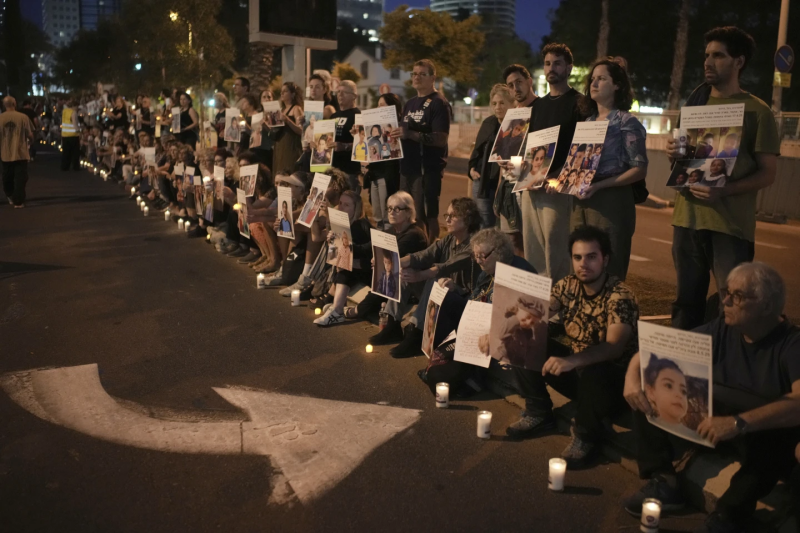- US Issues Travel Alert for Bangladesh Ahead of Election |
- Air ambulance carrying bullet-hit Hadi flies for Singapore |
- Can Dhaka’s arms recovery drive ensure peaceful polls? |
- ‘Unhealthy’ air quality recorded in Dhaka Monday morning |
- BD peacekeepers' deaths: UN chief calls Dr. Yunus, offers condolence |
Doctor loses 9 of 10 children in Israeli Gaza airstrike

Israeli activists hold photos of Palestinian children killed during the Israel air and ground operation in the Gaza Strip, calling for an end to the war, during a protest in Tel Aviv, Israel, Saturday, May 24, 2025.
A fresh wave of Israeli airstrikes has killed 79 people in Gaza within the past 24 hours, Gaza’s Health Ministry reported on Saturday. Among the dead were nine of a doctor’s ten children, an unimaginable loss that has shocked colleagues and underscored the war's deepening human toll.
Dr. Alaa Najjar, a paediatrician at Nasser Hospital in the southern city of Khan Younis, was on duty when Israeli airstrikes hit her neighbourhood. She raced home only to find her house engulfed in flames. Her husband was critically wounded, and their only surviving child—an 11-year-old son—was in grave condition, according to Dr. Ahmad al-Farra, head of the hospital’s paediatric department.
The children who perished ranged in age from just 7 months to 12 years old. Two of them remained buried under the rubble as of Saturday, said Khalil Al-Dokran, spokesperson for Gaza’s Health Ministry.
Israel’s military said it was targeting militants operating near its forces in what it described as a “dangerous war zone” in Khan Younis. The military claimed civilians had been evacuated from the area and stated that reports of civilian casualties were “under review.”
Meanwhile, the Israeli Air Force said it had carried out more than 100 strikes across Gaza over the last day. Saturday’s grim update brought the death toll in Gaza to 53,901 since the war began in October 2023 following a Hamas-led attack on southern Israel. The Health Ministry says 3,747 people have been killed in Gaza since Israel resumed its offensive on March 18, though it does not distinguish between civilians and combatants.
The latest escalation comes amid a severe humanitarian crisis. Gaza has been under a near-total blockade since March, preventing the entry of essential aid. Only in recent days have limited supplies begun to trickle in. Israel’s military body COGAT said that 388 aid trucks have entered Gaza since Monday—far below the 600 trucks a day that were entering during the previous ceasefire.
With famine looming, images of desperate Palestinians crowding around dwindling charity kitchens have pushed Israel’s allies to demand urgent humanitarian access. While the Israeli government has proposed a new U.S.-backed system for aid delivery, the UN and humanitarian organisations have rejected the plan, warning it risks turning food into a tool of war.
Hospitals, already crippled by power outages and shortages, are once again under siege. The Health Ministry reported that 11 security staff remain trapped at the European Hospital in southern Gaza following days of Israeli shelling. The hospital is the only remaining facility in Gaza offering critical services like neurosurgery, cardiac care, and cancer treatment.
Israel maintains that its campaign will continue until Hamas releases the 58 remaining hostages still held in Gaza. Less than half of those hostages are believed to be alive. Hamas, in turn, insists that any deal must include the release of Palestinian prisoners, a permanent ceasefire, and an Israeli withdrawal from Gaza—terms that Prime Minister Benjamin Netanyahu has repeatedly rejected.
At a weekly protest in Tel Aviv, Liran Berman, whose brother and nephew are among the hostages, voiced growing frustration with the stalemate: “The Israeli government and its leader have a clear choice—deal or war, saving lives or abandonment.”
As the war drags on, the grief of families like Dr. Najjar’s is becoming tragically routine—and a searing reminder of what’s at stake with each passing day of conflict.

